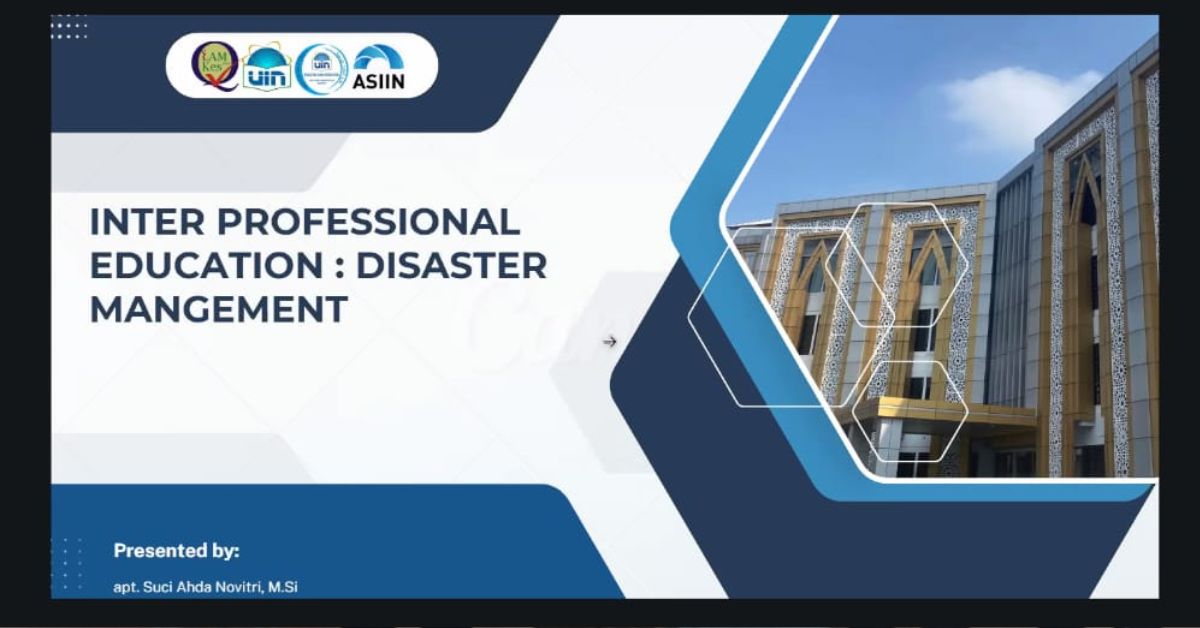IPE Webinar on Disaster Management and Islamic Perspectives: Raising Awareness of UIN Jakarta FIKES Students
Fikes Online News - The Faculty of Health Sciences (FIKES) of UIN Syarif Hidayatullah Jakarta held an Interprofessional Education (IPE) webinar on Disaster Management and the Islamic Perspective on November 11, 2025. The event was attended by 280 FIKES UIN Jakarta students and was held online via Zoom from 9:00 to 11:30 a.m. WIB.
The webinar featured three expert speakers in their fields: M. Khoirul Huda S. Th. I, M.A., Meliana Sari, MKM, and Suci Ahda, MSc., Apt. They discussed the importance of disaster management and how an Islamic perspective can serve as a foundation for disaster management.
"Disasters are not punishment, but rather tests and a means for human self-reflection. In Islam, every calamity contains wisdom that guides us to return to Allah, improve ourselves, and strengthen our faith," said M. Khoirul Huda, a lecturer at the Faculty of Usluhudin, in his presentation.
Meliana Sari, a lecturer in the Public Health Study Program, added that conducting a Rapid Health Assessment (RHA) is crucial as a first step in a rapid disaster response. Through the RHA, officers can verify the existence of an emergency, identify the impact of the disaster, and understand the community's basic needs. The RHA results serve as the basis for prioritizing actions and ensuring that the health response is carried out quickly, appropriately, and efficiently.


Meanwhile, Ibu Suci Ahda also emphasized the importance of managing medicines and medical supplies quickly, accurately, and appropriately at every stage of disaster management. She explained that cross-sector coordination and health logistics preparedness are crucial, from drug provision and storage to distribution to affected areas. "In emergency situations, effective logistics management can save lives and prevent further health crises," said Ibu Suci, a lecturer in the Pharmacy Study Program at the Faculty of Health Sciences, State Islamic University of Jakarta (UIN Jakarta).
Audience participation in the webinar was very active and interactive. Students from the Faculty of Health Sciences, State Islamic University of Syarif Hidayatullah Jakarta, demonstrated high enthusiasm, as evidenced by the numerous questions submitted to the speakers via the raise-hand feature and the Zoom chat box.
Fathul Majidi from the Pharmacy Study Program also posed a question regarding the application of Islamic values in disaster situations. He asked, "As healthcare workers who play a role in assisting during disasters, what is the most effective way to ensure that this fiqh is implemented among the general public experiencing a disaster? It would certainly be sinful for us to know the sharia but remain silent when it is not implemented."
Sita Nafeyla Putri Zahra from the Public Health Study Program asked, "What obstacles do healthcare workers typically face when conducting RHA, especially when they cannot interview community leaders at the disaster site? How can we ensure the data obtained remains accurate in these conditions?"
Adiva Khailla Maharani from the Nursing Study Program asked, "Is the Rapid Health Assessment (RHA) concept explained similar to the concept implemented abroad?"
This webinar is expected to raise student awareness about the importance of disaster management and the Islamic perspective in disaster management, which distinguishes the Faculty of Health Sciences (FIKES) at UIN Syarif Hidayatullah Jakarta from other FIKES in Indonesia. (DUI/AN/CA)

